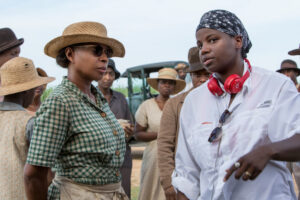by Kerry Torpey on April 26, 2018
Arts & Entertainment

by William Burleigh ’19
A&E Staff
Providence College’s Department of Black Studies recently completed a series of weekly film screenings titled “Black Women in Film.” The goal of the series was to celebrate films directed by African American women, an often underrepresented, underappreciated group in mainstream cinema. The third and final screening of the series was Pariah (2011), written and directed by Dee Rees.
Pariah tells the story of Alike, a young African American girl struggling to come to terms with and embrace her identity as a lesbian. Much of the conflict in this powerful story revolves around Alike’s relationship with her conservative parents and their attempts to suppress her sexual orientation. As Rees’ feature film directorial debut, Pariah originally premiered at the 2011 Sundance Film Festival and was awarded the Excellence in Cinematography Award.
The “Black Women in Film” series previously screened Dee Rees’most recent film, Mudbound (2017), which she also wrote and directed. Mudbound, a historical period drama, tells the story of two post-World War II families—one black, one white—their relationship with one another, and racism in rural Mississippi. Mudbound was praised by critics and Rees’ script was nominated for Best Adapted Screenplay at the 2018 Academy Awards.
Mudbound’s promotion of black women in film stretched beyond the directorial position. Rachel Morrison, the director of photography, was nominated for Best Cinematography at the Oscars. Morrison became the first ever woman to be nominated in the category. Additionally, well-known actress/musician Mary J. Blige became the first African-American woman to receive multiple Oscar nominations in the same year, with nods for Best Supporting Actress and Best Original Song.
Another black woman making significant strides for African-American representation in film is writer and director Ava DuVernay. Her breakout film Selma (2014), a Dr. Martin Luther King, Jr. biopic, was nominated for Best Picture at the 2015 Academy Awards, making DuVernay the first black female director to have her film nominated for Best Picture.
DuVernay’s historical documentary 13th (2016)—named after the 13th Amendment of the U.S. Constitution, which outlawed slavery—explores issues of racial injustice present in the American prison system, specifically the mass incarceration of African American men.
13th went on to be nominated for Best Documentary Feature at the 2017 Academy Awards, making DuVernay the first black woman to be nominated by the Academy in the Best Director category.
DuVernay’s recent fantasy film A Wrinkle in Time—a Disney adaptation of the 1962 novel by the same name—was released in March of this year. Featuring Oprah Winfrey, Mindy Kaling, and Reese Witherspoon, A Wrinkle in Time was celebrated for its message of female empowerment and diversity. DuVernay became the first woman of color to direct a live-action film with a budget of over $100 million, and the third woman to do so after Kathryn Bigelow (K-19: The Widowmaker, 2002) and Patty Jenkins (Wonder Woman, 2017).
DuVernay will be continuing her hot streak with another blockbuster, having recently been hired by Warner Bros. and DC Comics to direct a big-budget adaptation of The New Gods, a comic-book series from the 1970s.
Ultimately, the works of Rees and DuVernay serve as testaments to the abilities of African American women to create meaningful, entertaining, and important films when granted the opportunity. Many are hopeful that Hollywood studios will take notice of their success and offer a greater amount of directorial opportunities for not only African American women, but all women of color.